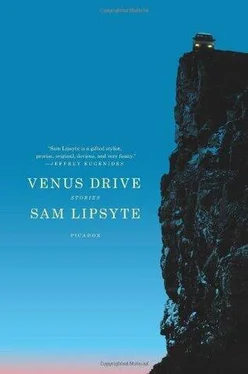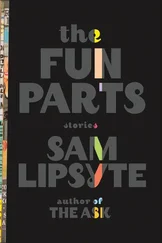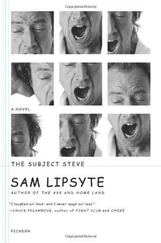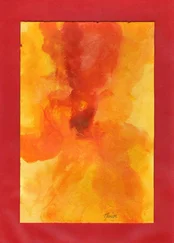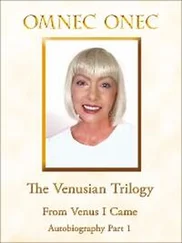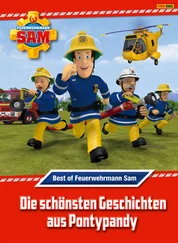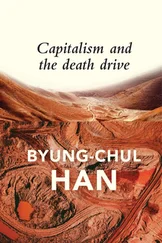Now comes a tender kind of animal squeal from off behind the woodpile. I know it, that sound, know it too well, and my heart frogs up. I find her there with that boy, Floyd. She is doing what she is doing as though it were some kind of contest where you have to be quick and cannot spill.
“Traitor!” I say.
“You don’t own me,” says Tina, “I belong to history, you dumb fuck.”
“Hello, comrade,” grins pinned Floyd.
My hook is up, hooked in the moon, but I cannot move, cannot take my eyes off the kid’s majestic thing. It’s like the first time I read Nietzsche, and Martin had to talk me down.
Now Martin talks me down once more. My hook, too.
“It’s okay,” he says, “it’s okay. Go back to the house. Go back to the house, man.”
Now I must be shouting. Martin’s hand is on my mouth. Now I must be biting. His knee on my neck.
That night I dream of sirens, the deep, womby wail of them slicing over trees, Lucy screaming, “Barricades! Barricades!”
It’s a two-pronged attack, what they call a pince-nez in tactical circles. Cherrytops roll off the pond road onto the compound, crunching ice. That kulak bitch trails them in her jeep, calling out the window, “Get those communists! Get those junkie creeps!”
“We are not communists!” I call out in my world-historical dream-world voice, which is deep and resonates with the inexorable.
Through the flames of the bonfire I see forms of men come through the birch line. They hop stumps and scrapwood, sweatshirts and facepaint caught in the hack of headlight beams. They have baseball bats and compound bows. Pistols squawk in the graveyard and the far-off woods. Rape shrieks come down from the prayer rock. The flower of our nation lies in puppet mounds around the fire pit.
There is Martin in a bloom of ruin among them.
I awake, peek out the attic window. The bonfire is an ash disk on the lawn.
I listen to Martin and Lucy, their Saturday morning coffee talk, or what slivers of it slat through my floor.
“I’m just worried that he’s really crazy.”
“What do you mean?”
“Just that. That something’s really off.”
“I know.”
“We should call his folks. Or maybe contact the psychiatric community, problematic as that may be.”
“Is this all the cream?”
“Take mine.”
“You know, I love you in that robe.”
“We’re not done talking about this, Martin. I’m going to call his folks. I think he’s snapped. He tried to kill Floyd.”
“He seems a little wiggy. I shouldn’t have given him that hook.”
“He smokes all of our pot.”
“He doesn’t really do much for international socialism.”
“Those things I said, I was angry.”
“I’ve been selfish.”
“Come here.”
Lucy hands me a stack of newspapers on the way out to my father’s car.
“Onward, upward,” she says.
We drive down the pond road.
“Well,” says my father, “I hope your little adventure in social unrest is over.”
“Guess so,” I say.
“When the freaks turn you out, then it’s time to re-evaluate things. Wouldn’t you agree?”
“You have a point.”
We pass the kulak’s house, turn onto the country road, go by White Power Pizza one last time.
“Hungry?” says my father.
“I’ll eat tomorrow,” I say.
Home is so fabricked and glowing. I had almost forgotten the softness of the world. Here’s my little room, the bed, the desk, the lamp, and my little mother in it, folding towels for me.
I am down in the valley now.
I eat many tomorrows away. I miss Martin’s cuisine. Everything here comes in plastic with a scissor line. I watch the men on TV in their good, dark suits, their free-market starch. Lucy would be laughing, Martin cursing, but I can only stare.
My mother and father say they see a leap for the good in me. I am quiet and take my boots off at the door.
I think of Tina often. I think of her in several fixed positions, with slight rotation.
Someday, I shit you not, the order will come down. Someone will surely be sending the orders down then. There will be a knock on the door, an old comrade in the glittering tracksuit of the new regime, chin pimples gone to grave divots. The state, he will explain, the new, glorious state, requires assistance with a certain hero of the people who has lost himself to rogue notions. We need a man, he will tell me, a man who can get in close, a man who is maybe a bit soft in the head but with a terrible hardness to him from all his short-term memory loss.
This order will come down and I will slip my hook in a grip for the road. I will take a slow bus up to the hills. We’ll sit there up on the prayer rock, Martin and me, talk of our victory, recall old struggles, laugh about the sandy sons. It will be a meeting of dearest friends and I will fill his bong for him from my private government stock. We will weep for Lucy, slain at the Battle of the Malls. We will mourn Floyd, him of huge heart and member, executed live via satellite, purged by fiends. We will rue those dark forces of counter-revolution and counter-counter-revolution that maneuver as we speak. We will sigh, admire the layers of light in the sky from the sunset behind us, build a fire for the cold coming night. I will hoist my hook from the grip, kept all these years, a memento of exile, of sacrifice.
“Hey,” Martin will say, “I’ve been looking all over for that fucking thing.”
“Forgive me, Bronsteins!” I will shout, hook my hook in my hero’s eye, drag him by the brow bone to his pyre.
Gary gets to pick a park. A nice gesture on the part of the state. Or is it the city? Gary studies the list, picks one far from home. Last thing he needs is a neighbor, a friend, family even, seeing him in some kind of get-up, coveralls, a neoprene vest, poking around with one of those trash-poke sticks.
The kids from the school, say, with their frisbees, their dogs.
It would get around.
It’s hard enough this woman at the desk knows what he’s done. Maybe she’s from a bootstrap family, foreign. Here’s Gary, lucky to be born a citizen, wasting his good fortune. All he can do now is try to set things straight.
He’ll start with the park.
He has some days before he’s supposed to report. He stays home, drinks O’Doul’s, shoots cocaine, watches the tube. It’s non-alcoholic, the O’Doul’s. Gary bought a case of it by mistake. They don’t mark things properly anymore. Still, it’d be wrong to pour it down the sink.
They have a tournament on TV, football, the other kind, countries, flags. He finds a team to follow, a side, Cameroon. So far, a Cinderella story, the color man says. But how does Cinderella end? Does she win? Gary hopes so. Something will happen to him if Cameroon loses. Maybe it’s stupid, reminds him of all the stupid people he always thought himself positioned against, but here he is: a rooter. It is not a good epoch for position-taking. How long is an epoch? Maybe he can wait it out.
He goes out at sundown, after the games, buys some bagels, cigarettes. This morning’s bagels marked down. A man stands near the bagel store. His legs are in leggings. Blanket strips? He’s bleeding from the mouth.
“They took my teeth!” the man says.
“They’re just getting started,” says Gary, gives the man a buck.
At the bank machine, Gary doesn’t check his balance. Better to leave it to the gods. Someday the machine will shun him. Why know when?
Gary had a band back when that was a good idea, toured the basements of Europe in a bus. The Dutch dug it best. The Dutch got the put-on underneath the hurt, the howl. Gary’s not sure he would get it himself anymore. This was years ago, before the whole thing got big, and small again. Now it’s gone. The tradition is gone. The kids at the school, they hardly even know that really famous group, the one with the singer who killed himself. The singer in Gary’s band killed himself, too.
Читать дальше
